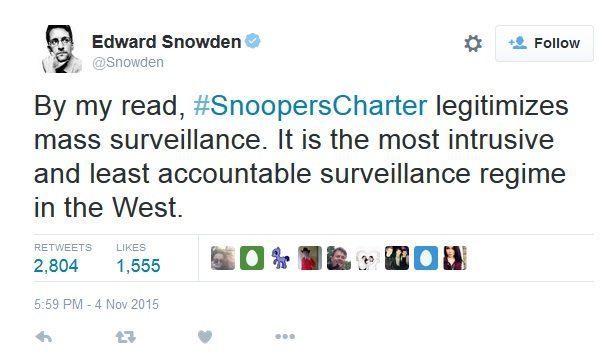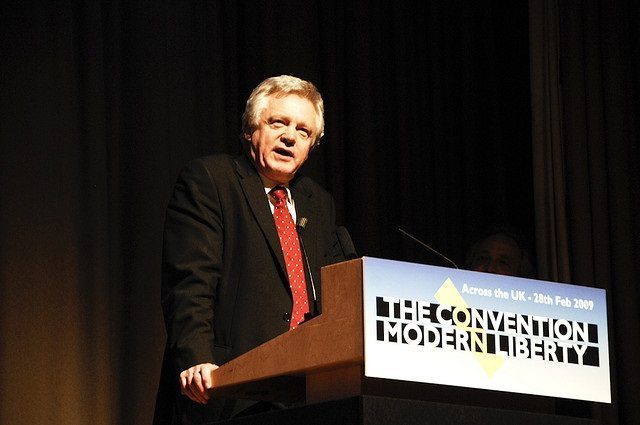[dropcap style=”font-size:100px; color:#992211;”]S[/dropcap]peculation as to what might have happened had the Conservative Party leadership election of 2005 gone differently might be somewhat of an indulgent experience.
Who, after all, cares in the slightest about what could have happened had some other monochrome, toff career politician topped the greasy blue pole, and anyway, these things are usually just that – speculation – and probably bear no resemblance to what would’ve actually happened.
Or maybe not. The thing is, the runner up to David Cameron in the aforementioned Conservative Party leadership contest was none other than a Mr David Davis. Now, Davis is a rare exception amongst his breed, to quote the renowned lefty journalist of the Daily Mirror, Kevin Maguire, the man is a “Tory with principles”. A rare thing indeed.
This man of principle, however, is increasingly in need. Since the Edward Snowden revelations, which publicised the mass surveillance techniques employed (primarily) by the British and American intelligence agencies, the UK public have proven to be a particularly nonchalant bunch when it comes to having their emails read and their Facebook correspondence eyed over.
Davis is an uncommon sight in the halls of power in that he sees the ever encroaching powers of the security services as a threat to personal freedom and is frustrated at the general public’s ambivalence on the issue, even going as far as calling the British “intellectually lazy” about defending it.
He’s got a point. Under the draft investigatory powers bill introduced by Theresa May, the Government will have access to any communications data that is 12 months old or less. Internet Service Providers (or ISPs) and Phone companies, once on a long leash and left pretty much alone, are now forced to back up a year’s worth of their information just in case the intelligence services fancy a sly peek at just what state your porn consumption is in.
Of course, officials protest that this is in service to the nation’s security and that only suspected terrorists have anything to hide. Apparently, through this we are all safer and can sleep a little better, and easier, at night because of it. Ekkhm, excuse me.
Of course things are slightly more complex than that. The draft bill stipulates that any secretary of state wanting to access di gital data on an individual must get a warrant, signed by a judge. “Brilliant,” I hear some say. “What’s the problem? Common sense and due process have won the day!” I thought similar things too, although briefly.
gital data on an individual must get a warrant, signed by a judge. “Brilliant,” I hear some say. “What’s the problem? Common sense and due process have won the day!” I thought similar things too, although briefly.
More controversy comes, however, when you see that, would the Home Secretary and the ‘overseeing’ senior judge disagree on a particular attempt to monitor communications, the judge would only be able to overrule the politician over the ‘process’, not the evidence. A terrifyingly poor safeguard. “As long as the home secretary has followed the correct procedure, the judge will go along with it,” says Davis, in an interview with The Guardian. “Judges hate overturning the executive, and it happens very rarely.”
So, where was the opposition to such a momentous change in the law? A change so mighty it provoked Edward Snowden to call it on Twitter “the most intrusive and least accountable surveillance regime in the West.” From the public, an insouciant, cold response at best. And from inside parliament, only a Labour Party in chaos and a rump of 8 Lib Dem MPs (the party under Nick Clegg who stopped this legislation in the last parliament) are putting up any sort of fight.
As for right-wingers? Davis is almost a lone protester.
Followers of US politics might be aware of characters like David Davis. Strong willed, libertarian-minded right wing politicians whose desire for low taxes is only overtaken by their hate for “big government” and the overbearing state. Ron Paul and his son Rand, the current flailing presidential candidate, are perhaps the two most famous examples. But if your eyes are trained solely on British political scene you’ll be aware that similar figures are pretty slim on the ground. Conservative MEP Daniel Hannan, a man so libertarian he might just be Ayn Rand with less hair, is one comparable politician, but his presence in the European Parliament (and not in the House of Commons) renders him  almost useless in these fights for freedom.
almost useless in these fights for freedom.
Even if you don’t share their laissez-faire Tory economics, their fear of totalitarian elements in government is commendable and – yes, dare I say it – radical. And this isn’t the first time Davis has found himself siding with principled leftists and liberals either: in 2009 he accused the Labour Government of the day of “outsourcing torture” in an attempt to wriggle round their obligations to international law.
His disdain for Labour’s “illusory pursuit of an unobtainable security” reached its loudest point in June 2008 when he resigned to force a by-election in protest at the extension of detention without charge from 28 to 42 days. A profoundly illiberal proposal designed as a response to – no prizes for guessing here – the increasing threat of terrorism. Even though neither Labour nor the Lib Dems fielded a candidate, the record breaking 72% of voters that returned him to parliament sent a clear message to all party leaders: civil liberties is a cause that can mobilise, even if it takes a political stunt to achieve it.
Davis’s work with organisations like Liberty (The National Council of Civil Liberties) and Big Brother Watch shows a strain of the activist in the man and a willingness to use public bodies to generate conversations. A useful trait when you’re a politician whose battles are with your own party leadership and subsequently the leaders of the country.
He is also able to get unsolicited support from communities with famously pro internet-freedom tendencies such as Reddit. In a template email which one user, cl0udaryl, encourages people to send to their local MP, they write: “”David Davis, a Tory backbencher is known to have issues with the bill and is our best chance at gaining support from within the Tories,” and that “…With the support of you, the electorate, he’ll have justification to further oppose and garner support.” In what universe do politicians get this sort of endorsement? Very few.
Post-Paris attacks the world looks like a lot scarier place from the perspective of a Western European. A victory, perhaps, for the mindless, torturous bastards who committed those atrocities. A victory, too, for the pro-surveillance, anti-freedom, anti-privacy politicians and activists (many from within the intelligence and security communities themselves) who want to continue expanding the remit of the state into our personal lives. A sad victory, also, for David Davis maybe? Whose (probably) fruitless opposition to this encroachment will not go unnoticed. He will be lauded in many circles and rightly so.
Meanwhile myself and others like me will go on hoping this rare beast becomes a little more common. Oh how it could have been so very different.
Photo by Miki Yamanouchi
Josh Adams is a freelance features writer and journalist who writes on politics, music and culture, with a particular interest in on issues and topics where these things intersect.
He is currently writing a book on the disease Myasthenia Gravis (with which he was suddenly diagnosed at 20 years old) called When Things Don’t Work.
Some of Josh’s previous work is avaliable at joshadams.info and you can email him at josh [at] joshadams [dot] info.




















